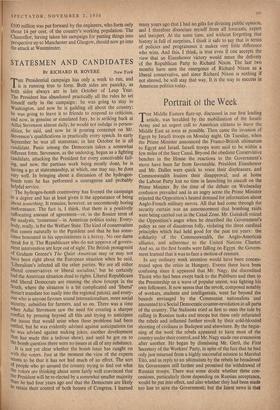Portrait of the Week
TlIE Middle Eastern Clare-up, discussed in our first leading article, was heralded by the mobilisation of the Israeli Army and an urgent call to American citizens to leave the Middle East as soon as possible. Then came the invasion of Egypt by Israeli troops on Monday night. On Tuesday, when the Prime Minister announced the Franco-British ultimatum to Egypt and Israel, Israeli troops were said to be within a few miles of the Suez Canal. Beyond the obedient Conservative benches in the House the reactions to the Government's move have been far from favourable. President Eisenhower and Mr. Dulles were quick to voice their displeasure. and Commonwealth leaders their disapproval; and at home the Labour Party lost no time in launching its assault on the Prime Minister. By the time of the debate on Wednesday confusion prevailed and in an angry scene the Prime Minister rejected the Opposition's heated demand for information about Anglo-French military moves. All that had come through the security curtain was an announcement that bombing raids were being carried out in the Canal Zone. Mr. Gaitskell voiced the Opposition's anger when he described the Government's policy as one of disastrous folly, violating the three cardinal principles which had held good for the past ten years : the solidarity of the Commonwealth, the Anglo-American alliance, and adherence to the United Nations Charter. And so, as the first bombs were falling on Egypt. the Govern- ment learned that it was to face a motion of censure.
In any ordinary week attention would have been concen- trated upon the crisis in Hungary. Events there have been confusing since it appeared that Mr. Nagy, the discredited Titoist who had been swept back to the Politburo and then to the Premiership on a wave of popular unrest, was fighting his own followers. It now seems that the revolt, composed notably of workers, students and intelligentsia, went far beyond the bounds envisaged by the Communist nationalists and amounted to a Social Democratic counter-revolution in all parts of the country. The Stalinists tried at first to stem the tide by calling in Russian tanks and troops but these only infuriated the rebels and inflamed further revolt by their cold-blooded shooting of civilians in Budapest and elsewhere. By the begin- ning of the week the rebels appeared to have most of the country under their control, and Mr. Nagy made one concession after another. He began by dismissing Mr. Gerd, the First Secretary of the Workers' Party, in spite of the fact that he had only just returned from a highly successful mission to Marshal Tito, and in reply to an ultimatum by the rebels he broadened his Government still farther and promised the withdrawal of Russian troops. There was some doubt whether these con- cessions, particularly those depending on Russian acceptance, would be put into effect, and also whether they had been made too late to save the Government; but the latest news is that Russian troops have begun their withdrawal and that free elections have been promised. The Russian acquiescence in these arrangements has been startling and has even been emphasised by their stated intention to review the numbers of Russian troops in other satellite countries. This mood of sweetness and light does not extend as far as their attitude to the West, however, for it is the official view that the insurrec- tions were caused by 'imperialist' fomentation, in particular the fund of $100 million devoted by Congress to the relief of East European refugees, and the Western attempts to draw atten- tion to the affair by referring it to the Security Council were met with vitriolic abuse from the Russian delegate. In Poland the new Gomulka regime seems to be well in the saddle. Marshal Rokossovsky has gone on leave and Cardinal Wyszynski, whose trial and condemnation in 1953 had been reminiscent of 1984, has been released from prison, as indeed has Cardinal Mindszenty in Hungary.
There has been other explosive foreign news. Casualties have occurred in Singapore, where rioters set fire to Government buildings and attacked Europeans. Unrest, in the shape of racial demonstrations against Malays and discontent against the Government, seems to have spread from Communists in Chinese secondary schools, who had been ejected after earlier riots, to other sections of the Chinese community. A quarrel with Ethiopia seems to be in the air, owing to her claim on the allegiance of a number of nomadic tribes in British Somaliland.
The American election campaign is in its last stages (a fact which has in some quarters been suspected of having had some bearing on the Israeli attack) and the general belief is that though Mr. Eisenhower will be re-elected the Democrats will gain a majority in both houses of Congress.
At home the request of the Transport Commission for a loan of £250 million to cover deficits has not perhaps captured the limelight it deserved. The Opposition has, however, man- aged to make itself heard on the subject of the Government's proposed measures to save £100 million—they include a charge of a shilling an item on National Health medical prescriptions instead of a shilling per prescription, and the addition of id. a pint to the price of milk during the winter.



































 Previous page
Previous page